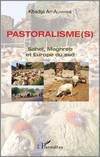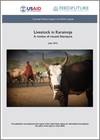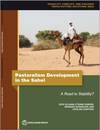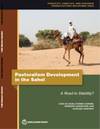La pérennité des sociétés pastorales repose sur une forme exceptionnelle de partage et de gestion collective de l'espace. Ce n'est pas tant la menace de la disparition de ces sociétés qui inspire ce livre mais les vertus de leur modèle collectif. Ce modèle s'oppose au modèle dominant dont la rentabilité à court terme est l'objectif premier. Des formes nouvelles d'élevage pastoral apparaissent. Restent à les concilier avec les traditions qui changent.
Year of publication: 2016Organization: كتاب مستقلون
Topic: اقتصاد, الإدراك الفطري
Language: Français
Type of document: تقني
Geographical coverage: أوروبا, شمال أفريقيا, غربية افريقيا, أفريقيا الوسطى
This report reviews information on livestock development in Karamoja, Uganda, leading to priorities for livestock development. The report notes the central role of livestock in livelihoods and economies, and a shift towards more supportive policies and programs for mobile livestock production in the region. The technical areas covered include veterinary services, water for livestock, feed and fodder, livestock marketing and policy issues.
Year of publication: 2016Organization: الوكالة الأمريكية للتنمية الدولية
Topic: اقتصاد, منظمة
Language: English
Type of document: تقني
Geographical coverage: شرق أفريقيا
This technical brief looks at the factors impeding development in pastoralist regions, and suggests possible solutions to improve pastoralist livelihoods. The brief is organized around the community capitals framework, which combines two major lines of assessing livelihoods: livelihoods-centred approaches and economy-centred approaches. Rather than regarding pastoralists as a problem, policymakers should see them as a major and indispensable contributor to the development of sparsely populated, marginal areas.
Year of publication: 2016Organization:
Topic: اقتصاد, الخدمات البيئية, أمن غذائي, بين الجنسين والشباب, نوع الملكية, مشاركة, خدمات اجتماعية
Language: English, Italiano, Español
Type of document: تقني
Geographical coverage: مناطق العالم
This 6-page policy brief urges to harmonize national and regional animal health frameworks, in particular in the Sahel region, where pastoralists need quality animal health services at an affordable price. Systems associating community animal health workers and veterinary doctors are indispensable to ensure the quality health service for animals. At the regional level, priority should be given to involving local and private veterinary services.
Year of publication: 2016Organization:
Topic: خدمات اجتماعية
Language: Nederlands, English, Français
Type of document: تقني, السياسات والتشريعات
Geographical coverage: غربية افريقيا
Pastoralism is one of the dominant economies of the Sahel and is by far the main economy on the fringes of the Sahara, a zone that has recently become very unstable. It is estimated that about 50 million people rely on pastoralism for their only or a main part of their livelihood in Sub-Saharan Africa; about half of them are located in the Sahel and the Saharan fringes, and of these about 70 percent are poor. The insecurity and instability in these areas directly lead to increased poverty of already poor pastoralists by interfering with their mobility. Competition over natural resources, especially land, has become an issue of major concern and cause of conflict between the Sahel’s pastoral and farming populations. Over the last several decades, the World Bank’s activities to develop this region have included improving the livelihoods of pastoralists. This note seeks to offer guidance to international, national, and local decision makers on the drivers of conflict and instability that are most related to pastoral communities, as well as possible measures to reduce violence and enhance stability in the Sahel. This note attempts to bring together two dimensions related to development: pastoral livelihoods resilience and conflict analysis.
Year of publication: 2016Organization: البنك الدولى
Topic: صراع, مرونة
Language: English
Type of document: تقني
Geographical coverage: غربية افريقيا
The goal of this film is to provide an overview of herders’ traditional ecological knowledge. The herders interviewed are traditional herders who possess a rich knowledge mostly inherited from the family and previous generations, and tested and adapted during their personal life. This film was made for the Regional Assessment for Europe and Central Asia of the Intergovernmental Platform on Biodiversity and Ecosystem Services (IPBES). A summary of the herders’ understandings, knowledge and arguments can be found here.
Year of publication: 2016Organization: كتاب مستقلون
Topic: الخدمات البيئية, الإدراك الفطري
Language: English, Magyar
Type of document: فيديو
Geographical coverage: أوروبا
This report is important for pastoralists as it explicitly mentions pastoralists in the introduction: “The same applies to pastoralist communities. Converting (pastoral areas) to sedentary agriculture evokes the idea that it is a win-win solution: poor people get their land, sometimes even with formal private titles, while the remainder of the pastoralist or shifting cultivation areas are then taken over by the state. Or, entire communities are just as easily relocated, since shifting cultivation and pastoralist fields are often categorized as state-claimed “empty” land."
Year of publication: 2016Organization: الاتحاد الأوروبي
Topic: نوع الملكية
Language: English
Type of document: علمي
Geographical coverage: مناطق العالم
This note seeks to offer guidance to international, national, and local decision makers on the drivers of conflict and instability that are most related to pastoral communities, as well as possible measures to reduce violence and enhance stability in the Sahel. It attempts to bring together two dimensions related to development: pastoral livelihoods resilience and conflict analysis.
Year of publication: 2016Organization: البنك الدولى
Topic: صراع
Language: English
Type of document: تقني
Geographical coverage: غربية افريقيا, أفريقيا الوسطى









